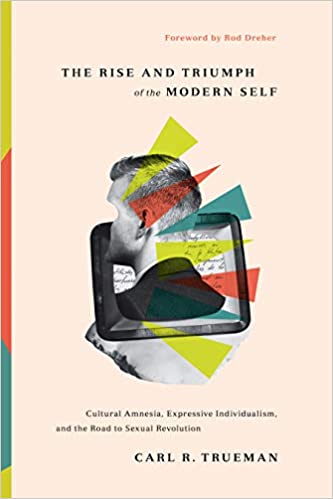
Carl Trueman’s newly-published masterpiece The Rise and Triumph of the Modern Self opens with an examination of the thoroughly modern statement sometimes heard, “I am a woman trapped in a man’s body”. Dr. Trueman observes that this statement would have called forth laughter from his late grandfather as “a piece of incoherent gibberish”, and yet now “to deny or question it in some way is to reveal oneself as stupid, immoral, or subject to yet another irrational phobia”. Not unnaturally, a thinking man like Dr. Trueman would like to know how such a radical cultural transition occurred in such a short period of time. Or, to state the matter otherwise, how is it that we fell asleep in a garden on the outskirts of Christendom and woke up inside a lunatic asylum in a gulag?—especially one where the inmates seem to be running the place. (Dr. Trueman, being a scholar, of course refrains from expressing himself so provocatively. Bloggers have privileges denied to scholars who write books.)
To answer the question fully one needs more space than that provided by a blog. And Dr. Trueman’s book indeed occupies more space, coming in at just over 400 pages, if one doesn’t count the impressive index after it or the fascinating forward by his friend Rod Dreher at the beginning. Such space is needed to accomplish his difficult and worthy goal, which is nothing less than understanding the deep roots of our modern culture (or our modern predicament) and the rise of the modern concept of self. Bluntly put, getting this crazy took some doing, and was the result of many converging movements and revolutions. Carl Trueman’s book tracks and analyzes these movements and revolutions.
In doing so, it takes the reader on quite a ride. It looks in turn at Philip Rieff, Charles Taylor, and Alasdair MacIntyre, then at Jean-Jacques Rousseau, Friedrich Nietzsche, Karl Marx, and Charles Darwin; then at Sigmund Freud; then at…well, you get the idea. Trueman has a talent for taking complicated ideas and explaining them in terms that any attentive reader can understand. Attentive reading is required though, given the complexity of the issues and the tangle of inter-connected ideas. But for those who take the trouble to read, each page makes a light go on. In a world as dark as ours and in such desperate need of illumination, this is no small gift.
The question is: why should anyone not a philosopher teaching students at a university care about any of this? In a word, because we are all lost in the culture in which we find ourselves, and that culture is in trouble. And as anyone who has gotten lost in a strange place knows, the first thing one does to get “unlost” is to pull out a map and figure out where they are and how they got there. The Rise and Triumph of the Modern Self is just such a map.
The book’s concluding chapter is entitled, Concluding Unscientific Prologue, and by this title Dr. Trueman tells us that the questions, issues, and challenges examined in the book are going to be with us for the foreseeable future. They are, in fact, the new world in which we must live, move, and have our being—i.e. the world in which we must raise our children, interact with our neighbours, and (if Christians) carry out the work of the Church. We will not be able to do any of this properly if we don’t understand where we are. There is nothing for it: we must find out where we are on the map if we are to navigate properly, find our way back, and reach our desired destination. Carl Trueman’s book is a perfect place to start.
